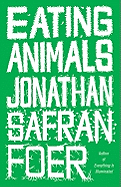

Throughout his college years, Foer flirted with vegetarianism (essentially avoiding meat until he wanted to eat it), but never gave serious thought to his dietary choices until the birth of his son. Then, faced with the prospect of making those choices for another person, he felt compelled to understand and investigate their impact in broader terms. Foer's research led immediately to factory farms, the source of 99% of all the animals consumed in the U.S. As Foer so ably demonstrates, it is impossible to overstate the horrors of factory farming, both in terms of sheer animal suffering and environmental devastation. The statistics are staggering: 83% of all chicken meat is infected with bacteria at the time of purchase, a typical hog factory farm produces 7.2 million tons of untreated manure annually, shrimp trawling accounts for 33% of global "bycatch" (the 145 other species that are regularly killed in the process)--and those are just a few. This is not to mention the almost unimaginable but well-documented cruelty inflicted upon the millions of animals engineered to become cheap meat, of which Foer provides many examples.
Much of the information regarding factory farms has already surfaced in other books and magazine articles. What distinguishes Foer's book is the attention he pays to narrative; that is, the stories we build around the food we eat and the culture and tradition built through these stories. It is difficult, Foer admits, to create a paradigm shift in consciousness when we are so trained to eat turkey at Thanksgiving that we willingly forget what it is and where it has come from. But a paradigm shift is exactly what we need and to illustrate this point, Foer tells the story of his grandmother, who escaped the Nazis and survived by eating scraps from garbage cans. When one day a kind farmer offered her some pork, she refused to eat it because it was not kosher. When Foer asked her why she wouldn't eat to save her life, his grandmother replied, "If nothing matters, there's nothing to save."--Debra Ginsberg
Shelf Talker: An extremely powerful and incredibly illuminating look at the moral and environmental impact of eating animals.

